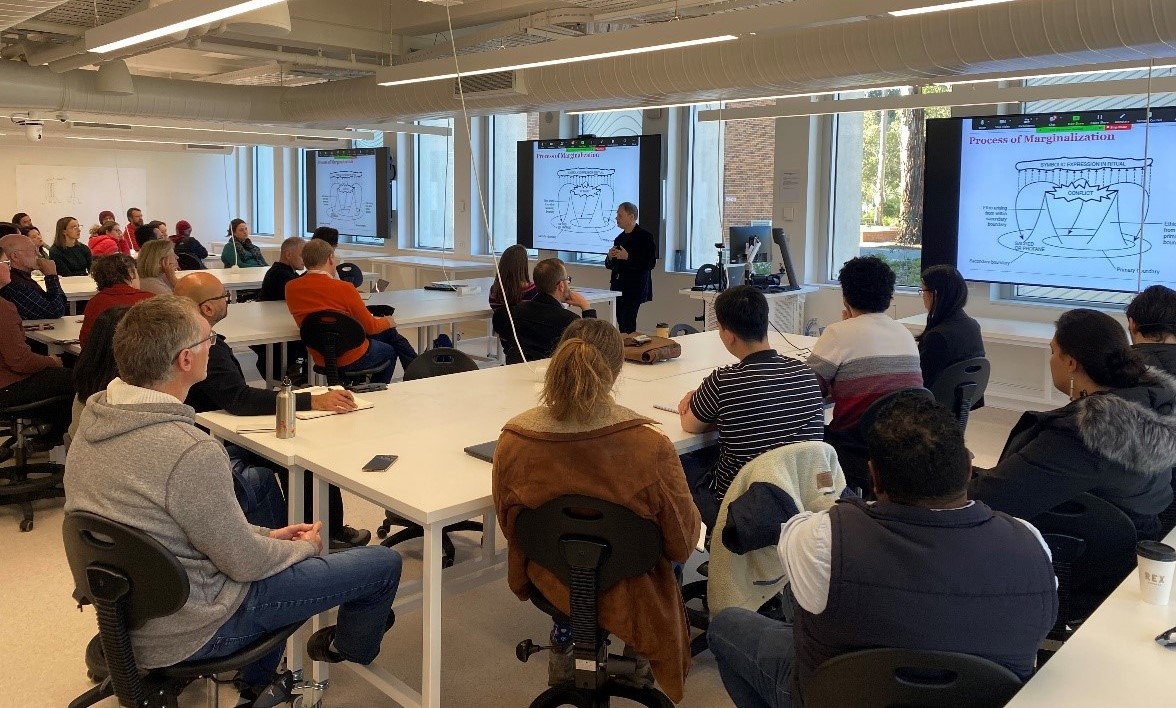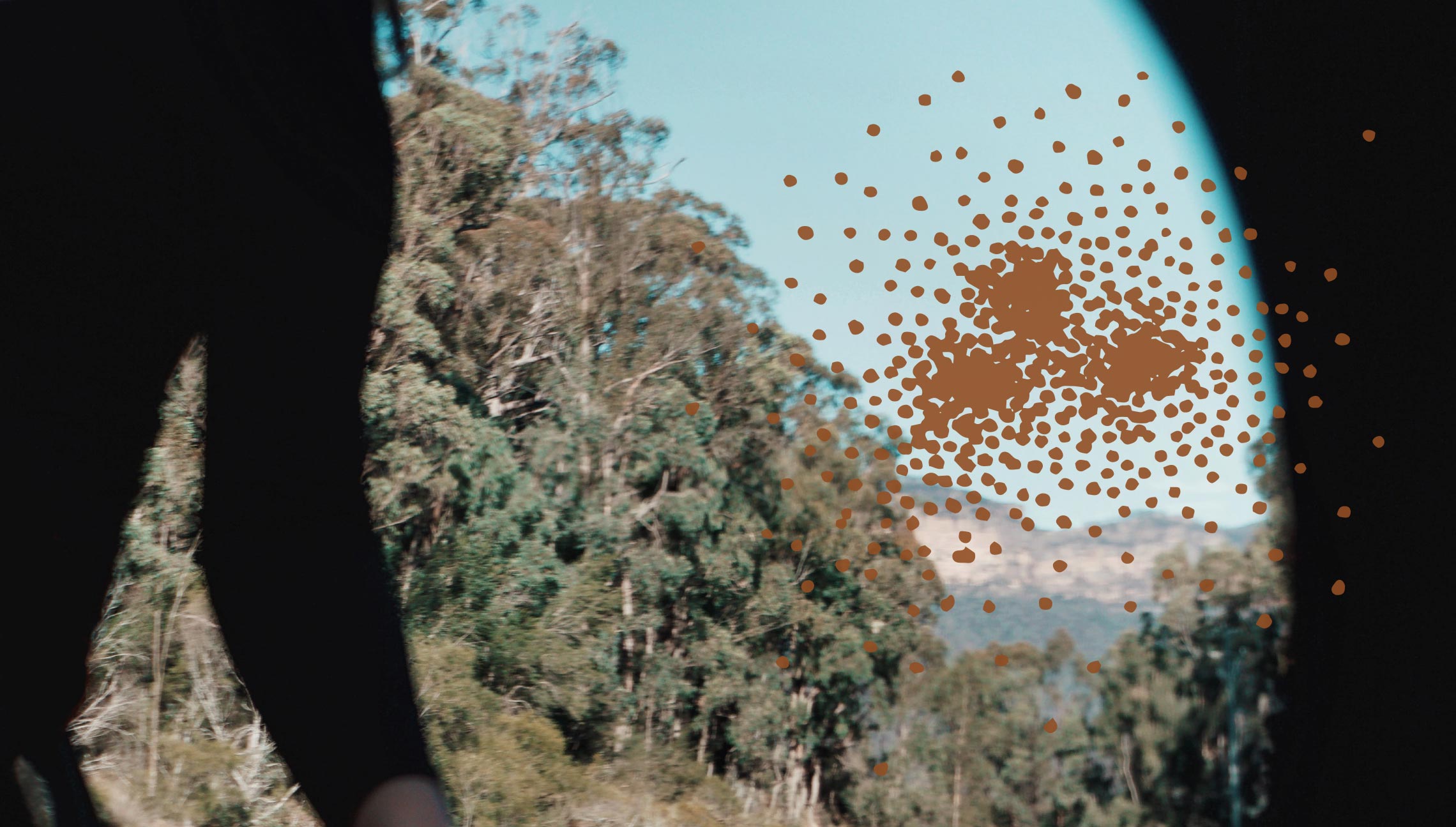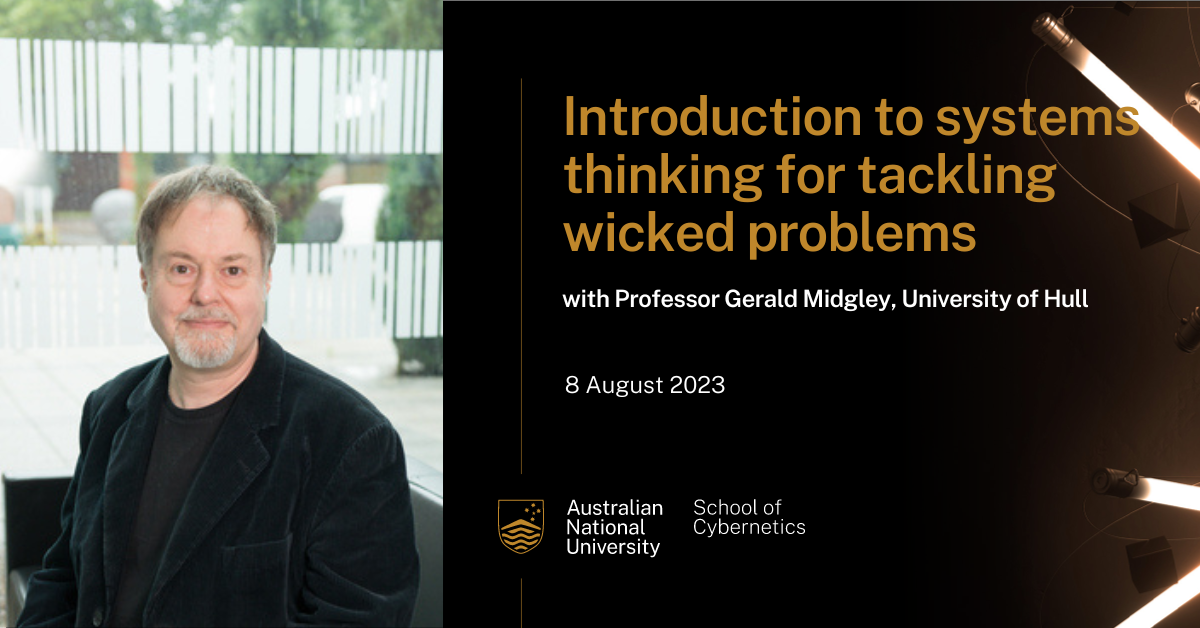The School of Cybernetics was delighted to host Professor Gerald Midgley of the University of Hull for a week-long visit in August. Professor Midgley is a recognised leader in systems analysis and systems thinking, where his work also has a strong pragmatic application for businesses, organisations, and governments.
The School and the wider ANU community were privileged to hear a series of talks by Professor Midgley. His seminar Introduction to Systems Thinking for Tackling Wicked Problems in particular drew a large crowd. In it, Professor Midgley laid out methods, approaches, and case studies showcasing ways to resolve protracted conflict by modelling the larger systems in play. By doing so, the definition and framing of the problem, and the often adversarial interests and perspectives of the vested parties, can be transformed into find a shared solution that avoids unfair marginalization, compromise, or tradeoffs.
As Professor Midgley explained, wicked problems by definition cut across social, technological, environmental, economic, and geo-political silos, and involve various sectors (public, private, and voluntary) at a variety of scales (local, regional, national, and global). Stakeholders inevitably hold differing viewpoints on these problems and can often be at odds especially over the causes and origins of the wicked problem, with the consequent apportioning of blame further aggravating the issue. Coupled with the uncertainty of potential outcomes of proposed actions, increasingly entrenched resistance with no hope of resolution on the horizon often becomes the reality in complex problems. Successfully addressing these challenges requires a kind of ‘whole picture’ thinking that systems theory enables, where mapping the interconnected nature of the objects, organisms, persons, groups, resources, and places involved can reframe how we view and approach them and lead to breakthroughs in solution generation. Professor Midgley underscored four key terms that aid in modeling wicked problems. The concept of ‘boundaries’ allows us to explore the value judgements that determines who or what is included or excluded from the problem definition, while mapping ‘relationships’ then becomes pivotal for comprehending the intricate web of causality, feedback loops, vicious and virtuous circles among the different components of the system, consequently providing insights into the possible repercussions of interventions. Turning to look at ‘perspectives’ allows us more effectively manage conflicts, through seeking to understand multiple viewpoints, fostering mutual comprehension, and devising practical solutions that stakeholders are willing to implement. Lastly, the focus on ‘systems’ prompts us to consider ways to construct adaptable and highly responsive organisations across diverse scales, allowing us to realise and put into practice the accepted solution.

Professor Midgley’s work is strongly synergistic with the School of Cybernetics’ focus on the study of complexity and the steering of decision-making within complex systems. Professor Katherine Daniell tells the story of how she first encountered Professor Midgley’s work she was undertaking research on participatory modelling for water planning in complex conflict-ridden river and estuary systems, and had been basing her engaged research approach to working directly with decision makers, government officials and communities on the French intervention and action approaches to management sciences. “To find a similar equivalent in English focused on systemic intervention and purposeful action to create change as a researcher, complete with much guidance on how to navigate multiple values, epistemologies and ontologies that were appearing in my work—particularly through his “creative design of methods” multi-methodology approach was particularly helpful for theoretically grounding the collaborative engineering of participatory processes we were developing”, says Daniell. “His book was much loved and annotated over the years, and I then followed many of the later papers and books of his, his colleagues and students. Thus when we started to set up the School of Cybernetics Masters and PhD and other Learning Experiences, engagement, and research processes, this approach has been one of the theoretical and practical DNA strands upon which these programs have been based. From a content perspective, this meant students were rapidly introduced to multiple perspectives and how to make choices about systems of interest through boundary critique, and then about how to approach their research with purposeful action-based research that works to bring together–through learning and social transformation–a range of theoretical frames and practical action. As part of this they also creatively design and reflect on the creation of their own methods in workshop design and implementation, working to bring together diverse knowledges and perspectives. Today, although Gerald’s work has not focused so much on technology, the School has been able to translate much of it, and add to it, for use in the design, development, building and decommissioning of a range of cybernetic systems due to the way the human and environmental facets—and the conflicts and values they bring—are so intricately woven into the systems we seek to navigate in the world.”
As Professor Midgley has done with business, governments, and community organisations all over the world, the School seeks to work together with its partners to attend to wicked problems that arise when technologies and autonomous systems are designed, deployed, and decommissioned in the world. Using these integrative ways of systems modelling to generate a win-win solutions for all stakeholders and the broader environments at large is a key remit of the School’s research and engagement agendas. The seminar offered an opportunity to further explore systemic intervention as a methodological approach. The School looks forward to ongoing and fruitful collaborations with systems thinkers everywhere.

